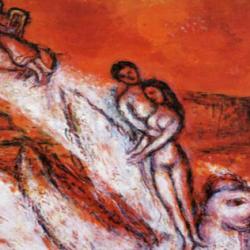INTRODUCTION
Solomon begins Ecclesiastes talking about the regularities of the natural world (1:3-11), and in chapter 3 turns to the regular rhythms of human life (3:1-8).
THE TEXT
“To everything there is a season, a time for every purpose under heaven: A time to be born, and a time to die; a time to plant, and a time to pluck what is planted . . . .” (Ecclesiastes 3:1-22).
EVERYTHING BEAUTIFUL IN ITS TIME
Human life moves between the various poles that Solomon describes in the opening to Ecclesiastes 3. Wisdom always involves recognizing the nature of the time, and doing what is fitting for that time. It is folly to shout in joy at a funeral, to speak when silence is required, to start a fight when we should be seeking peace. The Pharisees were foolish in this sense, not recognizing the tune of the times (Matthew 11:17). A wise life is thus a beautiful life; the wise man dances in step with what God is doing, and sings harmonizations on God’s music. Solomon also emphasizes once again that we are not in control of the changing times. We have some sense of the whole panorama of time (“eternity in the heart,” 3:11), but we can’t figure out how all God’s works fit together. They do, however: For the God of beauty makes everything beautiful in its time (3:11).
WHAT PROFIT?
Against this background, Solomon asks what profit a man has in his labor (3:9). Profit (Heb. yitron) is a key word in the book (cf. 1:3; 2:11, 13; 5:8, 15; 7:12; 10:10-11), and essentially refers to something gained, something left over, a surplus. Solomon is referring to the drive to show a profit, to be in the black, whether financially or otherwise. Yitron also carries the idea of advantage or leverage, and the man who pursues yitron is seeking to find a fulcrum by which he can move the world. Solomon says that there is no profit under the sun (2:11), and the thrust of his argument is that we cannot gain advantage. If all is “vapor,” where can we find a fulcrum? And, the world keeps moving on as it always has despite all our frantic efforts. Our lives must be lived in faith because our works don’t bring any profit; we are in the end unprofitable servants. The profit we can enjoy now is a profit “internal” to the labor God gives us, the good of the labor itself (3:13).
UNDER THE SUN
It’s important to see that Solomon has deliberately limited his observations to what is true “under the sun” or “under heaven” (3:1; cf. 1:3, 9, 14; 2:11, 17-18; etc). The sun is a marker of time (Genesis 1:14), and the phrase “under the sun” is more a temporal designation than a spatial one; it refers to a now rather than a there . Life under the sun is life prior to the time when the Lord will rend the veil of the heavens and the sun will give way to the light of the Lamb (Revelation 21:23). When Solomon says there is no profit “under the sun,” he is saying that there is no apparent accumulation, no surplus, in this world. In the larger biblical perspective, we know that there is a time beyond time under the sun, and we know by God’s promise that there is treasure, surplus beyond imagining, waiting for us there (Matthew 6:20; 1 Peter 1:3-5). Solomon hints at a similar point when he points out that God will bring all wickedness to judgment (Ecclesiastes 3:16-17). In this sense, the world is built so that we have to live by faith if we want to live without frustration. When there is no apparent surplus in our works, we trust that God has a surplus for us; when there is no apparent justice, we trust that there will be a final reckoning.
CONCLUSION
Christian life is thus life lived toward the future, by faith in eschatological promises. This doesn’t mean that Christians are life-denying. Rather the opposite is the case, as Solomon tells us (3:12-13). Only those who are oriented to eschatological profit can truly “seize the day” and its pleasures.















